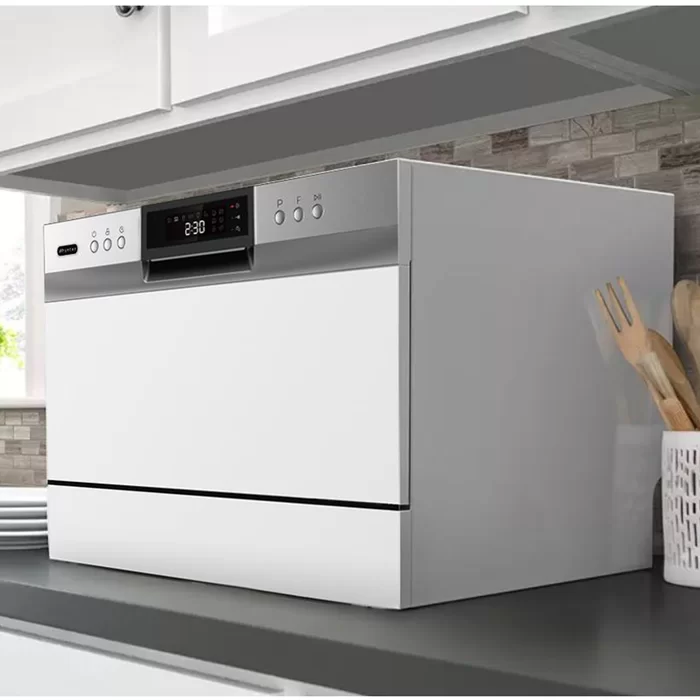How to Choose a Countertop Dishwasher (15 Factors)


Are you looking for a convenient solution to your dishwashing needs?
A countertop dishwasher could be the perfect answer.
In this guide, we’ll explore the key factors to consider when choosing a countertop dishwasher, making your decision-making process easier and more informed.
Whether you’re a homeowner with limited space or simply seeking a more efficient dish-cleaning option, this blog post will help you make a smart choice for your kitchen.
Let’s get started.
How to Choose a Countertop Dishwasher (Factors to Consider)

Choosing a countertop dishwasher requires careful consideration of several factors to ensure it meets your needs and fits seamlessly into your kitchen. Here’s an ultimate guide to help you make an informed decision:
1. Size and Capacity
Measure the available space on your countertop to ensure the dishwasher fits.
Consider the dishwasher’s capacity in terms of place settings. Typically, countertop dishwashers accommodate 4-6 place settings.
2. Water Consumption
Check the water consumption rate to ensure it aligns with your water usage preferences. Look for energy-efficient models that use less water.
3. Energy Efficiency
Look for ENERGY STAR-certified models to ensure energy efficiency and reduced utility costs.
4. Noise Level
Consider the noise level of the dishwasher, especially if your kitchen is close to living or sleeping areas. Quieter models typically have noise ratings around 50 decibels or lower.
5. Installation and Setup
Ensure the countertop dishwasher is easy to install and doesn’t require specialized plumbing. Look for models that come with a quick-connect adapter for the faucet.
6. Drying Mechanism
Check the drying mechanism of the dishwasher. Some models rely on air drying, while others have built-in heating elements for faster and more efficient drying.
7. Wash Cycles and Options
Assess the available wash cycles and options. Look for versatile models with different settings for various types of dishes, such as pots and pans, delicate items, and quick wash cycles.
8. Material and Build Quality
Evaluate the build quality and material of the dishwasher. Stainless steel interiors are durable and resist staining, while a durable plastic exterior can withstand daily use.
9. Brand Reputation and Reviews
Research the reputation of the brand and read customer reviews. This will give you insights into the reliability and performance of the countertop dishwasher.
10. Price and Warranty
Compare prices and features across different brands and models. Ensure the dishwasher comes with a warranty to protect your investment.
11. Ease of Maintenance
Check for features that make maintenance easy, such as removable filters and accessible parts for cleaning.
12. Water Filtration System
A built-in water filtration system can help prevent mineral deposits and ensure cleaner dishes. Check if the dishwasher you’re considering has this feature.
13. User-Friendly Interface
Look for a dishwasher with an intuitive and user-friendly control panel. This ensures easy operation and programming.
14. Compatibility with Detergents
Ensure the dishwasher is compatible with your preferred dishwasher detergent, including pods, tablets, or powder.
15. Customer Support
Check the availability and responsiveness of customer support for the brand. This is crucial if you encounter any issues with your countertop dishwasher.
Key Benefits of Buying a Countertop Dishwasher
Investing in a countertop dishwasher can offer several key benefits, making it a convenient and efficient addition to your kitchen. Here are some of the key advantages:
1. Space Efficiency
Countertop dishwashers are compact and designed to fit on your kitchen counter, making them ideal for small kitchens or apartments with limited space.
2. Portability
These dishwashers are often portable and can be moved easily. This is advantageous for renters or individuals who may relocate frequently.
3. Quick Installation
Countertop dishwashers typically have straightforward installation processes, often requiring only a standard electrical outlet and access to a kitchen faucet. No permanent modifications to your kitchen are necessary.
4. Water and Energy Efficiency
Many countertop dishwashers are designed to be energy-efficient and use less water than traditional dishwashers. This can lead to cost savings on utility bills.
5. Time-Saving
With their smaller capacity, countertop dishwashers are quicker to fill and run, making them a time-saving solution for smaller households or when you have a moderate amount of dishes to clean.
6. Convenience for Small Loads
When you have a few dishes that need cleaning, a countertop dishwasher allows you to run a cycle without waiting for a full load, helping to maintain a clean kitchen without unnecessary delays.
7. No Plumbing Modifications
Countertop dishwashers typically connect to the kitchen faucet, eliminating the need for complex plumbing modifications. This makes them a practical choice for renters or those unwilling to make permanent changes to their kitchens.
8. Cost-Effective
Countertop dishwashers are generally more affordable than built-in models. If you have a smaller budget or want a cost-effective solution, a countertop dishwasher is a viable option.
9. Ease of Use
These dishwashers often have user-friendly controls and straightforward interfaces, making them easy to operate for individuals of all ages.
10. Suitable for Small Families or Individuals
If you have a small family or live alone, a countertop dishwasher may provide sufficient capacity for your daily dishwashing needs without the excess space and energy consumption of a larger model.
11. Energy Star Ratings
Many countertop dishwasher models come with Energy Star ratings, indicating their energy efficiency and potential for reduced environmental impact.
12. Less Detergent Usage
Due to their smaller size, countertop dishwashers generally use less detergent, which can contribute to additional savings over time.
13. Minimal Maintenance
Countertop dishwashers often have fewer parts and are easier to maintain. Cleaning and upkeep are usually straightforward.
14. No Dishwashing Sinks Required
For those without built-in dishwashing sinks, a countertop dishwasher provides a dedicated space for washing dishes, promoting kitchen hygiene.
FAQs
How Big is a Countertop Dishwasher?
Countertop dishwashers are typically smaller than standard dishwashers, designed to accommodate 4-6 place settings. They are compact and space-efficient, making them suitable for smaller kitchens.
Can I Install a Countertop Dishwasher Myself?
Yes, many countertop dishwashers are designed for easy installation and can be set up without professional assistance. They usually connect to the kitchen faucet and require a standard electrical outlet.
Do Countertop Dishwashers Use a Lot of Water?
No, countertop dishwashers are generally designed to be water-efficient. They use less water compared to traditional dishwashers, contributing to reduced water consumption.
Are Countertop Dishwashers Energy-Efficient?
Many countertop dishwashers are energy-efficient, and some models are ENERGY STAR certified. This ensures they meet specific energy efficiency standards, helping you save on utility costs.
How Noisy Are Countertop Dishwashers?
Noise levels vary, but countertop dishwashers are generally quieter than their larger counterparts. Look for models with noise ratings around 50 decibels or lower for a quieter operation.
What Size Countertop Dishwasher Do I Need?
Consider the available space on your countertop and your daily dishwashing needs. Measure the dimensions of the dishwasher and choose a size that fits comfortably in your kitchen.
Can I Run Small Loads in a Countertop Dishwasher?
Yes, countertop dishwashers are designed to handle smaller loads efficiently. This is particularly useful when you have a few dishes that need cleaning, allowing for quicker cycles.
How Do I Connect a Countertop Dishwasher to the Faucet?
Most countertop dishwashers come with a quick-connect adapter for the kitchen faucet. The installation process is typically straightforward, and the dishwasher can be easily connected and disconnected as needed.
Are Countertop Dishwashers Suitable for Large Families?
Countertop dishwashers are more suitable for small to medium-sized households due to their limited capacity. Larger families may find a standard dishwasher more practical for their needs.
Do Countertop Dishwashers Dry the Dishes?
Yes, countertop dishwashers have drying mechanisms. Some rely on air drying, while others have built-in heating elements to speed up and enhance the drying process.
Wrap Up
Selecting the right countertop dishwasher involves balancing size, efficiency, and features to suit your lifestyle.
Prioritize factors such as water and energy efficiency, noise levels, and installation simplicity.
Consider your kitchen space and daily needs to find a compact yet powerful solution.
By taking these factors into account, you can make an informed decision, enhancing both the functionality and convenience of your kitchen without compromising on performance or efficiency.






